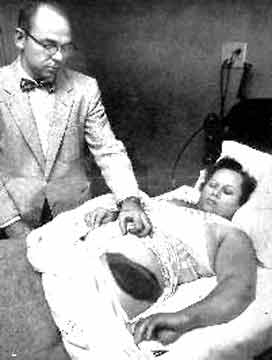1. How Torture Helped the Allies in WWII
Whatever role the bombings played in hastening Japan’s unconditional surrender, it was probably enhanced by the testimony of captured Air Force First Lieutenant Marcus McDilda. Though he initially professed to know nothing about the Manhattan Project or the atomic bomb that had been dropped on Hiroshima—because he didn’t—under torture he “confessed” that, contrary to Japanese hopes that the Americans could not possibly have produced more than a few, the United States had hundreds ready for deployment, with Tokyo and Kyoto next on the list of targets.
A distant Shaftoe relative, no doubt.
2. Can People Distinguish Pâté from Dog Food?
As seen on Colbert:
To prevent bias, Newman’s Own dog food was prepared with a food processor to have the texture and appearance of a liver mousse. In a double-blind test, subjects were presented with five unlabeled blended meat products, one of which was the prepared dog food. After ranking the samples on the basis of taste, subjects were challenged to identify which of the five was dog food.
One of the researchers keeps a blog, Blind Taste.
3. Rules for Time Travelers: #5 — Black holes are not time machines.
Sadly, if you fell into a black hole, it would not spit you out at some other time. It wouldn’t spit you out at all — it would gobble you up and grow slightly more corpulent in the process. If the black hole were big enough, you might not even notice when you crossed the point of no return defined by the event horizon. But once you got close to the center of the hole, tidal forces would tug at you — gently at first, but eventually tearing you apart. The technical term is spaghettification. Not a recommended strategy for would-be time adventurers.
4. Neuroeconomics has failed Americans in 5 key ways
The type of punditry I aspire to.
What is their promise? Very simple: Neuroeconomists promise that if investors, taxpayers and voters simply follow the advice of neuroeconomists, they’ll get rich. Your 401(k) and your retirement portfolios will prosper because neuroeconomics promises to make you “less irrational,” in control of your brain, and therefore, a successful investor.
Sorry, but that’ll never happen. Never. The human brain is, and always will be, irrational.
5. Free radicals after exercise are good, okay?
Forty men took part in a four-week training program. Half the group also received daily doses of Vitamins C and E. The researchers discovered that exercise on its own improves insulin sensitivity, which keeps diabetes at bay. But taking the vitamins erased that gain—findings that appear in the May 12th issue of the Proceedings of the National Academy of Sciences.
6. The challenge of proving a negative: woman struck by meteorite

[T]he Hodges Meteorite […] blasted through the roof of a home in Sylacauga, Ala., in 1954. It bounced off a radio and hit Ann Elizabeth Hodges, badly bruising her hand and hip.
Leave a comment